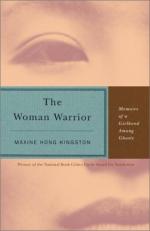|
This section contains 5,358 words (approx. 18 pages at 300 words per page) |

|
SOURCE: "A Marginal 'I': The Autobiographical Self Deconstructed in Maxine Hong Kingston's The Woman Warrior," in Biography, Vol. 17, No. 3, Summer, 1994, pp. 281-95.
In the following essay, Melchior explores the issues of identity, the traditional Western concept of self, and the American tradition of autobiography raised by Kingston's rendering of her memoir in The Woman Warrior.
Autobiography has been called the "preeminent kind of American expression" [Robert F. Sayre, "Autobiography and the Making of America," in Autobiography: Essays Theoretical and Critical, edited by James Olney, 1980], perhaps because its autonomous "I" is strikingly congruent with the "I" of American ideology. Many critics see this genre as arising from the conscious awareness, in Western culture, of the "singularity of each individual life," a singularity that induces a sense of the self as individual rather than communal. The history of autobiography, says Mary Mason, is "largely a history of the Western obsession...
|
This section contains 5,358 words (approx. 18 pages at 300 words per page) |

|


